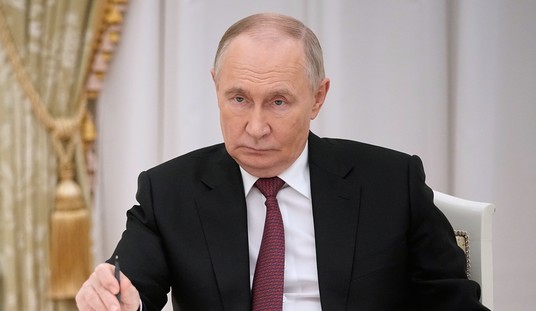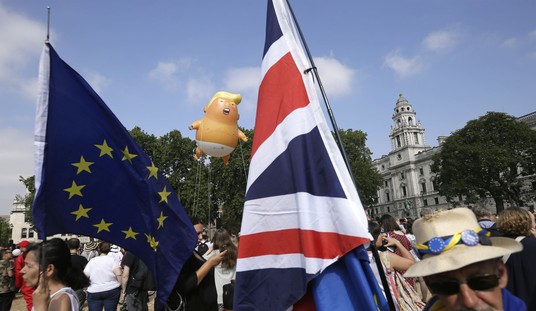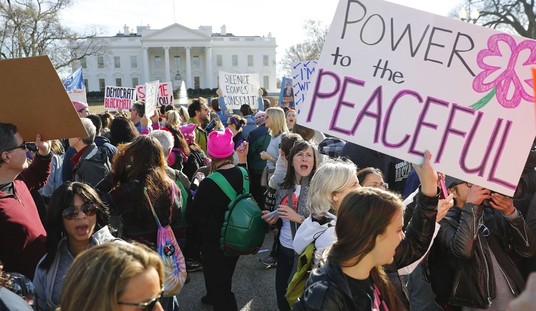No one ever accused Donald Trump of being a goldbricker. (Gold bricks? Hmmmm….) CBS News takes a look back at Week 1 of the Trump Era in Washington DC, and notes the significant changes already ordered by the new president, literally in some cases. President Trump has issued fifteen executive actions, and CBS provides a scorecard:
To paraphrase Stanley Kubrick, have conservatives and populists stopped worrying and learned to love the EO? Not really, no, but it helps to understand the nuances of executive orders and presidential memoranda. CBS’s Rebecca Shabad makes the distinction:
Seven days into his first term, Mr. Trump has issued more than a dozen executive actions, which include a government-wide freeze on new and pending regulations, the reinstatement of a policy that bars U.S. funding to health providers abroad that discuss abortion as an option and a call for the construction of a physical wall along the U.S.-Mexico border.
Most of the actions taken so far are technically presidential memoranda, and four have been executive orders, which have the force of law and must be published in the Federal Register. Historically, presidents have embraced the executive order as a tool to use when there’s a lack of action from Congress.
Shabad misses one nuance; executive orders have the force of law within the executive branch, not outside of it. To the extent they conflict with existing statutes, they have no force at all. This was the issue with Barack Obama’s executive actions, most of which did not come in the form of EOs.
For instance, the Deferred Action for Childhood Arrivals (DACA) program is one of the most notorious of Obama’s unilateral actions. It was launched by DHS under Obama’s direction, but not in the form of an EO. DACA was presented as a policy of prosecutorial discretion rather than a new program, but Congress never authorized the costs involved. Two years later, Obama launched Deferred Action for Parents of Americans and Lawful Permanent Residents (DAPA) under similar circumstances. These actions clearly required Congressional approval to change statutory law, and courts have agreed, at least initially.
Trump’s EOs, in comparison, have so far mainly stuck to exercises of authority within the executive branch’s jurisdiction, and not crossed over into conflicting with statutes. The only EO that likely crossed that line was his first, in which Trump instructed HHS to relax enforcement of statutory mandates as well as regulations related to ObamaCare. However, Obama did exactly the same thing by executive direction over the objections of Congress. That doesn’t make Trump correct in this exercise of presidential authority — he’s not, in this instance — but Obama set the specific precedent on the very same law, and one can argue that it’s never been fully enforced in all of its broad reach.
Even the EO that got sent out last night is, regardless of its wisdom, fully within the authority and jurisdiction of the executive branch. DHS is allowed to make determinations on refugee admission and to curtail it when necessary for the security of the United States. Trump is hardly the first president to set limits and restrictions on this process, and as a GOP aide told Jake Tapper, his restrictions aren’t the most onerous, either:
House GOP aide: "Fun fact: under Bush fewer refugees came in than the limit Trump just set. But hey it's Trump so let's lose our minds."
— Jake Tapper (@jaketapper) January 28, 2017
And as Kirsten Powers reminded people earlier this afternoon, the Obama administration took similar action in 2011 for a full six months, twice as long as Trump’s EO provides:
https://twitter.com/KirstenPowers/status/825411853392179200
The EO sets out an annual limit of 50,000 refugees — not exactly a full-on block, although there are temporary blocks in place for refugees from Syria and six other countries in the region. By the way, six of the seven nations restricted in this EO are either failed or near-failed states racked by civil war where radical Islamist terror networks hold significant ground. The other is Iran, which is the world’s largest state sponsor of terrorism. In 2011, only Iraq and Somalia could have been described as failed states and nests of Islamist terrorism, but now we have more — and that does seem to be the common thread.
The authority to do this rests entirely in the executive branch, and as Sean Davis points out, we got an example of that from Barack Obama this month:
https://twitter.com/seanmdav/status/825366935529463809
As Ari Melber explained to MSNBC, Trump’s actions are “probably” legal:
This EO does fall within presidential authority, and also fulfills Trump’s oft-repeated campaign pledge to limit access to refugees from areas plagued by terrorism. That of course does not necessarily make the EO entirely wise. The media’s reporting that this EO applies to those with permanent residency — “green cards” — which would be an overreaction, but … the EO itself doesn’t make reference to permanent residents. That comes from a DHS spokeswoman’s e-mail to the media; expect that to get clarified soon. The categorical suspension leaves some difficult cases in limbo, and perhaps our credibility on the battlefield too, in some cases:
Some veterans and refugee advocates are worried that an executive order by President Trump to temporarily suspend refugee admissions into the U.S. will hurt foreign interpreters who helped American troops in war.
“With today’s Executive Order, the President has shut the door on thousands of foreign interpreters, our wartime allies, who served alongside our military since 2001,” said Matt Zeller, Army veteran, and CEO and co-founder of No One Left Behind.
Zeller, who served in Afghanistan, fought to get his Afghanistan War translator, Janis, to the U.S., despite an enormous existing backlog of applications.
“As you know, without Janis, my Afghan translator, I would not be speaking to you today. I would have been killed by two Taliban fighters in the hills of Afghanistan and not fighting for interpreters’ rights today,” Zeller said.
But again, this is the same situation as with Obama’s six-month hold:
As a result of the Kentucky case, the State Department stopped processing Iraq refugees for six months in 2011, federal officials told ABC News – even for many who had heroically helped U.S. forces as interpreters and intelligence assets. One Iraqi who had aided American troops was assassinated before his refugee application could be processed, because of the immigration delays, two U.S. officials said. In 2011, fewer than 10,000 Iraqis were resettled as refugees in the U.S., half the number from the year before, State Department statistics show.
That’s only a fifth of the limit that Trump has set for this year, albeit an overall limit rather than limited to a single country.
Trump does have a habit of laying down markers and then negotiating the boundaries afterward. In this case, one can probably expect some flexibility on individual cases, and perhaps an even quicker review of policies and vetting procedures than would have happened without a dramatic action. Hopefully this will get resolved more quickly than critics think, and we’ll be on firmer footing in dealing with these issues in the future. Either way, the issue here is the policy, not the EO as a policy mechanism.
As far as EOs go, though, don’t expect there to be too much conflict on the Right over them, mainly because Trump won’t need to legislate through EOs and other executive actions. He has a friendly Congress to push his agenda, and an opposition party reeling from eight years of disastrous setbacks. For the next two years, anyway, legislating by pen and phone won’t be on Trump’s mind.
Update: From Washington Post correspondent Jenna Johnson, some clarification:
White House official to reporters: Green card holders in the US will have to meet with a consular officer before leaving the country.
— Jenna Johnson (@wpjenna) January 28, 2017
To clarify: This applies just to the green card holders from the seven majority-Muslim nations designated in Trump's executive order. https://t.co/S3K90eFSkK
— Jenna Johnson (@wpjenna) January 28, 2017
This still seems problematic, though. What do they get if State clears them for re-entry — a Green Card with oak leaf cluster? The point of the green card is that the US has allowed the holder to establish permanent residency and to come and go under some well-defined limitations, with proper passport. This will only take place for ninety days, and so it’s not a long-term issue, but this seems poorly thought out.








Join the conversation as a VIP Member